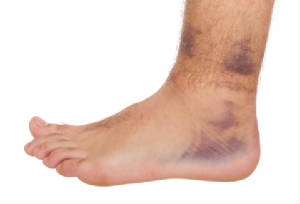|
Monday, March 24, 2014
Man with Neuropathy Struggles with Living Conditions Wheelchair bound, Rafee Baksh not only struggles with neuropathy, but also his new house. “How do they expect me to live like this?” Baksh
complains, stressing that everyday tasks like going to the bathroom and bathing are difficult for him in a new house provided
for him by the Redbridge Council. Baksh’s
housing situation is said to be temporary until the Redbridge Council can locate a house better equipped for the disabled.
Due to an accident involving his mobility scooter, Baksh was relocated from his old home in Ilford. Baksh claims that the
Council told him that the new home would be suitable for him before he was moved in while Redbridge says they offered him
help and he refused. The feet and ankles are susceptible to systemic diseases. If you are struggling with a systemic disease, consult with podiatrist Dr. Karin Johansson, DPM of New York. Dr. Johansson can treat all your foot and ankle needs. Systemic Diseases
of the Feet Systemic diseases affect the whole body, and symptoms usually
are displayed in the feet. This condition can make a patient’s ability to walk unbearable. Systemic diseases include:
gout, diabetes mellitus, neurological disorders, and arthritis. Gout – is caused by
an excess of uric acid in the body. Some common symptoms include pain, inflammation, and redness at the metatarsal/phalangeal
joint of the base big toe. Gout can be treated by NSAIDs, which relieves pain and inflammation and other drugs which
lowers the acid levels in the body.
Diabetes mellitus- is an increase in the level of blood
sugar in which the body cannot counteract with the insulin in the body. When the body doesn’t produce enough insulin
this is a factor in Diabetes.
Diabetes of the Feet ●Diabetic Neuropathy – may lead to damaged nerves
and affect the feet through numbness and loss of sensation. ●Peripheral Vascular Disease- can restrict the blood flow to the feet, and often times lead to amputation of
the feet. If you have any questions, please contact our office located in New York, NY. We offer the newest diagnostic and treatment technologies for all your foot care needs. Read
more about Systemic Diseases of the Feet
Tuesday, March 18, 2014
Expert Rules Out Popular No Shoe Rule in the Home Many cultures adopt the no-shoe policy, believing it to serve a hygienic benefit. Stephen S. Morse, a professor of epidemiology at the Mailman School of Public
Health at Columbia University says that viruses and bacteria can be distributed throughout the house from the sole of the
shoe. In fact, fungi and viruses
can be inhabited in carpets and surfaces as well. Fungi are known for causing athlete’s foot while viruses can be responsible
for plantar warts. Although these facts seem
to support a no shoe policy, Morse says that the risk of contracting any foot condition due to wearing shoes in the home is
actually very low. He even says that dirt could be beneficial, “The Hygiene Hypothesis says that one of the reasons
why we see asthma and allergies is because the immune system isn't being kept busy with fighting off the bad guys.”
As a result, Morse feels that the policy is not worth it. Plantar
warts can become infected and lead to worse conditions when left untreated. If you have plantar warts, come and see podiatrist
Dr. Karin Johansson, DPM of New York. Dr. Johansson will treat your plantar warts with the attention and care any foot and ankle condition needs.
About Plantar Warts Plantar warts are the result of HPV, or human papillomavirus getting into open wounds on the feet.
They are mostly on the heels or balls of the feet. Some symptoms include: ·
Some pain while standing · Tenderness
in the foot’s sole · Cosmetic discomfort (embarrassment)
While plantar warts are generally harmless, those experiencing
excessive pain or those suffering from diabetes or a compromised immune system require immediate medical care. Plantar warts
are easily diagnosed, usually through scraping off a bit of rough skin or a biopsy.
Several
methods for treating plantar warts exist. They include: · Freezing
·
Electric tool removal · Laser
Treatment · Topical Creams (prescription
only) · Over the counter medications ·
Apple Cider Vinegar Soak To avoid
plantar warts, refrain from walking barefoot in public areas and avoid direct contact with warts.
If you
have any questions, please contact our office located in New York, NY. We offer the newest diagnostic and treatment technologies for all your foot care needs. Read more about Plantar Warts
|